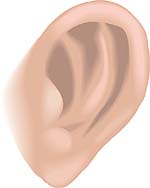Glue Ear: Symptoms, Causes and Treatment

It wouldn’t feel very good to have glue in your ear, would it? But some children and adults suffer from a condition that’s been appropriately dubbed “glue ear”. What is glue ear, and what kind of problems can it cause?
What is Glue Ear?
Glue ear is a condition where the middle ear fills with a thick, sticky fluid that has the consistency of glue. It’s most common in children, although adults can get it too. The medical term for glue ear is chronic otitis media with effusion, which simply means build-up of fluid in the middle ear.
What Causes Glue Ear?
Glue ear is most common in kids who get repeated ear infections. If the Eustachian tube that connects the ear to the throat becomes inflamed or swollen, it increases pressure in the middle ear, which leads to fluid build-up. Since the swollen Eustachian tube can’t adequately drain the fluid, it remains in the middle ear canal where it can thicken — leading to the classic symptoms of glue ear.
What are the Symptoms of Glue Ear?
Children with glue ear may experience ear fullness, but the most serious symptom is hearing loss, which occurs because the glue-like material in the middle ear impedes normal hearing. Fortunately, this hearing loss is reversible with treatment, but kids with glue ear may have trouble keeping up in school due to difficulty hearing the teacher. It can also delay speech development.
How is Glue Ear in Children Treated?
Many cases of glue ear in children resolve on their own over time. Unfortunately, if a child is having hearing problems, a “wait-and-see” approach may not work. Some doctors use antibiotics and decongestants to treat glue ear, which may be effective, but antibiotics have side-effects.
As a last resort, some doctors recommend placement of ear tubes for better ventilation and drainage of the middle ear. This should be reserved for cases that are unresponsive to other treatments and in situations where there’s hearing loss, especially since half of the cases of glue ear resolve without treatment within three months.
The Bottom Line
Glue ear can cause short-term hearing loss in kids who have it, but it’s a condition that usually goes away spontaneously over weeks to months. For this reason, the placement of ear tubes isn’t necessary in most cases.
Author: Dr. Kristie Leong, MD.
|